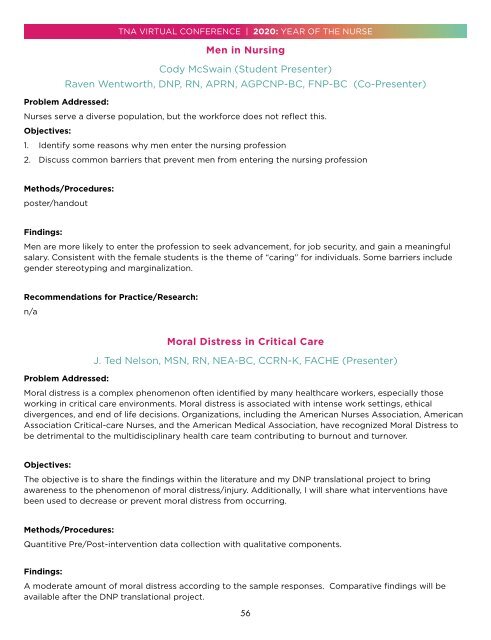Tennessee Yearbook 2020
Create successful ePaper yourself
Turn your PDF publications into a flip-book with our unique Google optimized e-Paper software.
TNA VIRTUAL CONFERENCE | <strong>2020</strong>: YEAR OF THE NURSE<br />
Men in Nursing<br />
Cody McSwain (Student Presenter)<br />
Raven Wentworth, DNP, RN, APRN, AGPCNP-BC, FNP-BC (Co-Presenter)<br />
Problem Addressed:<br />
Nurses serve a diverse population, but the workforce does not reflect this.<br />
Objectives:<br />
1. Identify some reasons why men enter the nursing profession<br />
2. Discuss common barriers that prevent men from entering the nursing profession<br />
Methods/Procedures:<br />
poster/handout<br />
Findings:<br />
Men are more likely to enter the profession to seek advancement, for job security, and gain a meaningful<br />
salary. Consistent with the female students is the theme of “caring” for individuals. Some barriers include<br />
gender stereotyping and marginalization.<br />
Recommendations for Practice/Research:<br />
n/a<br />
Problem Addressed:<br />
Moral Distress in Critical Care<br />
J. Ted Nelson, MSN, RN, NEA-BC, CCRN-K, FACHE (Presenter)<br />
Moral distress is a complex phenomenon often identified by many healthcare workers, especially those<br />
working in critical care environments. Moral distress is associated with intense work settings, ethical<br />
divergences, and end of life decisions. Organizations, including the American Nurses Association, American<br />
Association Critical-care Nurses, and the American Medical Association, have recognized Moral Distress to<br />
be detrimental to the multidisciplinary health care team contributing to burnout and turnover.<br />
Objectives:<br />
The objective is to share the findings within the literature and my DNP translational project to bring<br />
awareness to the phenomenon of moral distress/injury. Additionally, I will share what interventions have<br />
been used to decrease or prevent moral distress from occurring.<br />
Methods/Procedures:<br />
Quantitive Pre/Post-intervention data collection with qualitative components.<br />
Findings:<br />
A moderate amount of moral distress according to the sample responses. Comparative findings will be<br />
available after the DNP translational project.<br />
56

















